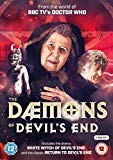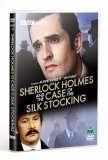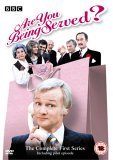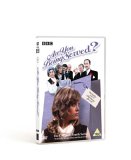 The Daemons of Devil's End (Region 0 Multi Region DVD) | DVD | (13/11/2017)
from £N/A
| Saving you £N/A (N/A%)
| RRP
The Daemons of Devil's End (Region 0 Multi Region DVD) | DVD | (13/11/2017)
from £N/A
| Saving you £N/A (N/A%)
| RRP This special DVD release contains two unique productions. The first is the brand-new drama production WHITE WITCH OF DEVIL S END starring DAMARIS HAYMAN, who reprises her role as Olive Hawthorne from the DOCTOR WHO story THE DAEMONS. With a blend of dramatic monologue enhanced with visualisations and sound design to develop and tell the stories, the drama is an anthology of tales following the magical life of Olive Hawthorne, from childhood to her final days as the protector of Devil s End. Drawing on a rich heritage and appreciation of witchcraft and fokelore, the stories bring Olive's history to life, pitting her against vampire, succubus, fae, daemonic influence and more - as Guardian of Devil's End, she must do what she must to protect the village ... but what happens when she reaches the end of her life? Who will protect the townsfolk then? The second is the long-awaited DVD release of the classic documentary RETURN TO DEVIL S END . Filmed around the village of Aldbourne in 1992, this marvellous production stars JON PERTWEE (The Third Doctor), NICHOLAS COURTNEY (The Brigadier), RICHARD FRANKLIN (Capt. Yates), JOHN LEVENE (Sgt. Benton) and THE DAEMONS director, CHRISTOPHER BARRY. NICHOLAS BRIGGS (currently the voice of the Daleks in DOCTOR WHO), takes the cast and director on a trip around the locations, deftly gleaning stories and anecdotes about filming the classic DOCTOR WHO series in 1971. Including interviews with villagers and rare archive film and photos ... this documentary is rightly considered one of the best behind-the-scenes look at the making of DOCTOR WHO ever produced. Both discs are packed with bonus features, making this a totally unique production! PLUS! A third bonus disc containing video of conventions held in Aldbourne to celebrate one of DOCTOR WHO s most fondly remembered stories.
![The Beat Beneath My Feet [DVD]](/pictures/1136318.jpg) The Beat Beneath My Feet | DVD | (20/07/2015)
from £4.99
| Saving you £10.00 (200.40%)
| RRP
The Beat Beneath My Feet | DVD | (20/07/2015)
from £4.99
| Saving you £10.00 (200.40%)
| RRP Tom (Nicholas Galitzine) is a teenage loner with dreams of becoming a rock star, but he is thwarted by his God-fearing single mother, Mary (Lisa Dillon). Tom's life takes a dramatic turn when an intimidating stranger moves into the flat below and plays loud rock music throughout the night. Tom recognises his new neighbour (Luke Perry) as Max Stone, a disgraced American rock legend who disappeared years earlier owing a fortune in unpaid tax and has been presumed dead. Tom agrees not to reveal Max to the authorities on condition that he teaches him the dark arts of rock guitar.
![The Two Of Us - Series 1 - Complete [DVD] [1986]](/pictures/1098278.jpg) The Two Of Us - Series 1 - Complete | DVD | (08/02/2010)
from £N/A
| Saving you £N/A (N/A%)
| RRP
The Two Of Us - Series 1 - Complete | DVD | (08/02/2010)
from £N/A
| Saving you £N/A (N/A%)
| RRP Nicholas Lyndhurst - fresh from his success in the endlessly popular Only Fools and Horses - stars as twenty-something computer programmer Ashley opposite Janet Dibley as Elaine his marriage-phobic girlfriend in this long-running sitcom from LWT. This first series also featuring one of the last TV roles for Doctor Who legend Patrick Troughton was originally screened in 1986 and is available here for the first time in any format. Ashley Phillips is an average young man with a fairly average set of ambitions: he yearns for semi-detached bliss with a mortgage a wife and a baby. He already shares a basement flat with the fiercely independent Elaine a doctor's daughter but she resolutely rejects every one of Ashley's marriage proposals. To make matters worse Elaine works in a cr''che - an eye-opening experience that has left her with absolutely no desire to start a family... at least not just yet! Although Ashley's life is frequently interrupted by the ministrations of his overbearing mother Lilian there is always someone he can turn to for advice on matters of the heart: Perce his laid-back and lovable granddad.
![About A Boy [Blu-ray]](/pictures/1149005.jpg) About A Boy | Blu Ray | (22/04/2019)
from £7.99
| Saving you £N/A (N/A%)
| RRP
About A Boy | Blu Ray | (22/04/2019)
from £7.99
| Saving you £N/A (N/A%)
| RRP Will, a rich, child-free and irresponsible Londoner in his thirties who, in search of available women, invents an imaginary son to attend single parent meetings. As a result of one of his liaisons, he meets Marcus, an odd 12-year-old boy with problems at school. Gradually, Will and Marcus become friends, and as Will teaches Marcus how to be a cool kid, Marcus helps Will to finally grow up.
![Danger Close [DVD]](/pictures/1151825.jpg) Danger Close | DVD | (06/04/2020)
from £7.25
| Saving you £N/A (N/A%)
| RRP
Danger Close | DVD | (06/04/2020)
from £7.25
| Saving you £N/A (N/A%)
| RRP ![Skins: Series 1-7 (Repackage) [DVD]](/pictures/1150670.jpg) Skins: Series 1-7 (Repackage) | DVD | (14/10/2019)
from £N/A
| Saving you £N/A (N/A%)
| RRP
Skins: Series 1-7 (Repackage) | DVD | (14/10/2019)
from £N/A
| Saving you £N/A (N/A%)
| RRP The complete series of the multi-BAFTA® award-winning drama SKINS. Follow the chaotic lives and loves of three generations of college students as they grab life by the balls and live it to the max. Join the rollercoaster as their teen lives mix with the madness of the adult world around them. This ground-breaking series stars some of the UK's finest young acting talent: Dev Patel (Slumdog Millionaire), Kaya Scodelario (Wuthering Heights), Nicholas Hoult (X-Men), Jack O'Connell (Harry Brown), Hannah Murray (Game of Thrones), Luke Pasqualino (The Borgias).
![Only Fools And Horses - Time On Our Hands [1996]](/pictures/1014827.jpg) Only Fools And Horses - Time On Our Hands | DVD | (09/02/2004)
from £6.87
| Saving you £9.12 (132.75%)
| RRP
Only Fools And Horses - Time On Our Hands | DVD | (09/02/2004)
from £6.87
| Saving you £9.12 (132.75%)
| RRP The third episode in the Only Fools and Horses Christmas Trilogy by John Sullivan It seemed the usual Trotter farce: Raquel's parents visiting for dinner Rodney doing a stock take (artifical leg Showaddywaddy LPs)... Then Raquel's antique dealing father makes a discovery in the lock up. Before you can say ""this time next year Rodders ..."" our heroes are in Sotheby's about to realise their dreams and finally become - millionaires!!
![Tommy (Special Edition) [1975]](/pictures/1005457.jpg) Tommy (Special Edition) | DVD | (14/06/2004)
from £13.73
| Saving you £-0.75 (N/A%)
| RRP
Tommy (Special Edition) | DVD | (14/06/2004)
from £13.73
| Saving you £-0.75 (N/A%)
| RRP Even by the standards of a genre not characterised by restraint, the 1974 rock opera Tommy is endearingly barmy, a bizarre combination of Pete Townshend's disturbed inspiration and director Ken Russell's wildly eccentric vision. Even if you gamely try and read allegorical meaning into it, the story is frankly odd: a child becomes psychosomatically deaf, dumb and blind after witnessing the murder of his father by his stepdad and goes on to become rich and famous as the world pinball champion (since when was pinball a world-class competitor sport?), before setting himself up as a latter-day messiah. It's about the travails of the post-war generation, the disaffection of youth, the trauma of childhood abuse, the sham nature of new-age cults, and many other things besides. At least, that's what Townshend and Russell would have you believe. But what's really important is the many wonderful, utterly bonkers set-pieces--effectively a string of pop videos--that occur along the way, performed by great guest stars: Tina Turner as the Acid Queen, Eric Clapton as the Preacher, Keith Moon as Uncle Ernie, Elton John's mighty rendition of "Pinball Wizard", even Jack Nicholson doing a turn as a suave specialist. Roger Daltrey is iconic in his signature role, and Oliver Reed makes up for a complete inability to sing with a bravura performance as his sleazy stepdad, but best of all is Ann-Margret as Tommy's mother Nora: her charismatic presence holds the loose narrative together and she richly deserved her Academy Award nomination; the sight of her in a nylon cat suit being drenched in baked beans and chocolate from an exploding TV set is worth the price of admission alone. On the DVD: Tommy comes to DVD in a two-disc set, with the feature on disc one accompanied by three audio tracks: Dolby Stereo or 5.1 surround, as well as the original "Quintaphonic" surround mix--a unique experience with effectively two pairs of stereo tracks plus a centre track for the vocals. The anamorphic picture adequately recreates the original theatrical ratio. The second disc has a series of lengthy and illuminating new interviews with the main (surviving) players: Townshend, Russell, Daltrey and Ann-Margret, in which we learn among other things, that Daltrey wasn't Townshend's first choice for the role, that Stevie Wonder was the original preference for the Pinball Wizard, and that Ken Russell had never heard of any of these rock stars before agreeing to helm the movie. There's also a feature on the original sound mix and its restoration for DVD. All in all, a satisfying package for fans of one of the daftest chapters in the annals of rock music. --Mark Walker
![All Creatures Great & Small Series 1-3 inc Christmas Specials [DVD]](/pictures/1161577.jpg) All Creatures Great & Small Series 1-3 inc Christmas Specials | DVD | (12/12/2022)
from £26.99
| Saving you £N/A (N/A%)
| RRP
All Creatures Great & Small Series 1-3 inc Christmas Specials | DVD | (12/12/2022)
from £26.99
| Saving you £N/A (N/A%)
| RRP ![Doctor Who - The Web of Fear [Blu-ray] [2021] (Limited Edition)](/pictures/1154071.jpg) Doctor Who - The Web of Fear | Blu Ray | (16/08/2021)
from £16.99
| Saving you £N/A (N/A%)
| RRP
Doctor Who - The Web of Fear | Blu Ray | (16/08/2021)
from £16.99
| Saving you £N/A (N/A%)
| RRP In order to escape an attack in space, the TARDIS makes an unscheduled landing and ends up deep inside the London Underground. Here the travellers soon find themselves engulfed in a thrilling battle with the Great Intelligence and the Yeti, a deadly enemy set to invade the Earth. But as events take a turn for the worse, it becomes clear that the golden prize is not just the Earth, but the Doctor's mind too... This release includes all 5 surviving episodes, plus a brand new fully animated reconstruction of the missing 6th episode created from the surviving audio-only recordings.
![American Pie 4K Ultra HD [Blu-ray] [Region Free]](/pictures/1165455.jpg) American Pie 4K Ultra HD | Blu Ray | (21/10/2024)
from £28.85
| Saving you £N/A (N/A%)
| RRP
American Pie 4K Ultra HD | Blu Ray | (21/10/2024)
from £28.85
| Saving you £N/A (N/A%)
| RRP You'll never look at warm apple pie the same way again after you've seen the unrated version of American Pie! Take a hysterical look at the goal of four unlucky in love high school friends who make the ultimate pact: lose their virginity by prom night.As they try to manipulate their way into the hearts of some of their classmates, their plans often backfire with hilarity. Follow the raging hormones of four teenage boys and their girls as they gear up for the most important night of their lives... the prom? This bona fide coming of Age classic has now been remastered in 4K from the original negatives by those horny teenagers at 88 Films.
![Kramer vs Kramer [1979]](/pictures/1018237.jpg) Kramer vs Kramer | DVD | (02/05/2011)
from £4.38
| Saving you £1.61 (36.76%)
| RRP
Kramer vs Kramer | DVD | (02/05/2011)
from £4.38
| Saving you £1.61 (36.76%)
| RRP It might have started out as a small, rather arty divorce drama but Kramer vs Kramer was the biggest cinema hit of 1979. It confirmed Dustin Hoffman's status as a major star in a performance that combined his trademark twitchy intensity with deep sensitivity. And it provided Meryl Streep with a pivotal role in her rise to big-screen greatness. Both won Oscars, as did director Robert Benton and the film itself scooped the Best Picture award. Kramer vs Kramer has worn well into the 21st century. Although clearly of its time--by the late 1970s, microscopic relationship analysis had become the theme of commercial cinema--it stands on the strength of its central performances. Hoffman's Ted Kramer is a vision of the Graduate grown up: serious, focused and thrown by anything that threatens his upwardly mobile professional trajectory. The news that his wife, who he has failed to notice teetering on the edge of a breakdown, is leaving him and their son sends him into a tailspin. The film is as much about his resilience and fulfilment as it is the story of a divorce and custody battle. Justin Henry is extraordinary as Billy, the boy caught in the middle, and turns in a remarkably complex, thoughtful performance, which is light years from the archetypal all-American kid you might anticipate. And in just a handful of scenes, Streep is mesmerising as Joanna, the deserting wife and mother who you just can't bring yourself to hate. Yes, this is soap opera. But it belongs up there with all the finest cinematic human dramas. On the DVD: The widescreen presentation ensures a theatrically authentic experience, with some fantastic shots of New York city coming into their own. The mono sound is adequate for the relative intimacy of most of the dialogue. But the real bonus is the retrospective documentary in which director and writer Benton, producer Stanley Jaffe and the cast look back with touching satisfaction at a piece which clearly meant a great deal to them all. Hoffman's initial reluctance (he was going through a real-life divorce) to get involved, the process of working with a gifted child actor and Streep's desire to make Joanna understood are all recalled in fascinating detail. --Piers Ford
![Skins - Complete Series 1-7 [DVD]](/pictures/1121664.jpg) Skins - Complete Series 1-7 | DVD | (12/08/2013)
from £N/A
| Saving you £N/A (N/A%)
| RRP
Skins - Complete Series 1-7 | DVD | (12/08/2013)
from £N/A
| Saving you £N/A (N/A%)
| RRP The complete series of the multi-BAFTA award-winning drama Skins. Follow the chaotic lives and loves of three generations of college students as they grab life by the balls and live it to the max. Join the rollercoaster as their teen lives mix with the madness of the adult world around them. This ground-breaking series stars some of the UK's finest young acting talent: Dev Patel (Slumdog Millionaire) Kaya Scodelario (Wuthering Heights) Nicholas Hoult (X-Men) Jack O'Connell (Harry Brown) Hannah Murray (Game of Thrones) and Luke Pasqualino (The Borgias).
![Buffy The Vampire Slayer: Season 5 [DVD]](/pictures/1144665.jpg) Buffy The Vampire Slayer: Season 5 | DVD | (18/09/2017)
from £N/A
| Saving you £N/A (N/A%)
| RRP
Buffy The Vampire Slayer: Season 5 | DVD | (18/09/2017)
from £N/A
| Saving you £N/A (N/A%)
| RRP The fifth season of Joss Whedon's hit series started out in excellent form as slayer extraordinaire Buffy Summers (Sarah Michelle Gellar) did battle with the most famous of vampires (that Dracula guy) and then went on to spar with another nemesis, little sister Dawn (Michelle Trachtenberg). Wait--Buffy has a teenage sister? Where has she been the past four years? And why is everyone acting like she's always been around? Turns out that young Dawn is actually "The Key," a form of pure energy that, true to its name, helps open the gates between different dimensions. To protect said key from falling into the wrong hands, a group of monks gave it human form and sent it to the fiercely protective Buffy for safekeeping, creating new memories of Dawn for everyone as if she'd existed... well, always. Why all the super secrecy? There's this very, very, very bad girl named Glory (Clare Kramer) who wants the key very badly, and will do anything to get it. Oh, and by the way, Glory isn't just a run-of-the-mill demon... she's way worse. Some fans will tell you that Buffy "jumped the shark" with the introduction of Dawn, when in actuality this season was the pinnacle of the show's achievement, as there was superb comedy to be had ("Buffy Vs. Dracula," the double-Xander episode "The Replacement," the introduction of the "Buffybot" in "Intervention") as well as some of television's best drama. The Whedon-scripted and -directed "The Body" remains one of Buffy's best episodes, when the young woman who faces down supernatural death on a daily basis finds herself powerless in the wake of her mother's sudden passing. The first third or so of the season was a bit choppy, but once the evil Glory came into her own, Buffy was a television force to be reckoned with. Kramer was the show's best villain (after the evil Angel, natch), and the supporting cast was never better. But as always, it was the superb Gellar who was the powerful centre of the show, sparking opposite lovelorn vampire Spike (James Marsters) and wrestling with moral dilemmas rarely seen on television. With this season, Buffy Summers became, like Tony Soprano, one of television's true greats. --Mark Englehart
 Sherlock Holmes And The Case Of The Silk Stocking | DVD | (21/03/2005)
from £11.92
| Saving you £1.07 (8.98%)
| RRP
Sherlock Holmes And The Case Of The Silk Stocking | DVD | (21/03/2005)
from £11.92
| Saving you £1.07 (8.98%)
| RRP November 1902. Fog and shadows engulf the city. The murky world of the menacing London docks collide with the glamour and glitter of Edwardian high society as sleuth Sherlock Holmes and Dr John H Watson are reunited to solve a case which threatens to overwhelm the privilege and tranquillity of aristocratic society. When the murder of a penniless shop-girl is linked to the body of debutante Lady Alice Burnham Holmes immediately begins to piece together the clues: a pair of dancing sho
 Are You Being Served? - Season 1 And Pilot | DVD | (25/07/2005)
from £N/A
| Saving you £N/A (N/A%)
| RRP
Are You Being Served? - Season 1 And Pilot | DVD | (25/07/2005)
from £N/A
| Saving you £N/A (N/A%)
| RRP ""I'm free!"" With these words just one unforgettable character among many in this classic TV sitcom was born. From the comedy pens of Jeremy Lloyd and David Croft (Dad's Army) came the DepartMental comedy madness that is Are You Being Served?. There's hilarity at Grace Brothers the High Street department store with a difference. Join in the fun as limp-wristed Mr Humphries and that blue-rinsed batle axe Mrs Slocombe lead the outrageous department store staff t
![Lock, Stock & Two Smoking Barrels [DVD] [2019]](/pictures/1149195.jpg) Lock, Stock & Two Smoking Barrels | DVD | (27/05/2019)
from £8.97
| Saving you £N/A (N/A%)
| RRP
Lock, Stock & Two Smoking Barrels | DVD | (27/05/2019)
from £8.97
| Saving you £N/A (N/A%)
| RRP Four nice, but petty criminals find themselves heavily in debt to a murderous London gangster after a crooked card game. To cover their debts and literally save their skins, they decide to rob a bunch of thugs who have just robbed a group of pot growers.
![Danielle Steel's Once In A Lifetime [1994]](/pictures/1019406.jpg) Danielle Steel's Once In A Lifetime | DVD | (24/02/2003)
from £8.47
| Saving you £-2.48 (N/A%)
| RRP
Danielle Steel's Once In A Lifetime | DVD | (24/02/2003)
from £8.47
| Saving you £-2.48 (N/A%)
| RRP An endearing and tragic love story that follows the life of a popular American novelist Daphne Fields struggling to come to terms with bringing up her deaf son alone after the heartbreak of losing her husband and daughter in a house-fire. As the only reminder of the family she once had she devotes her life to her son's upbringing with outstanding courage forever putting his happiness before her own. She finds strength in Dr. Matt Dane who is dedicated to the care and attention of deaf children. He offers support and comfort as her writing career takes off and she is forced to make many personal sacrifices. But Daphne is scared. Scared that she will never find the happiness she once had and scared that she will never be able to love again.
![The Russia House [1990]](/pictures/1019843.jpg) The Russia House | DVD | (29/04/2002)
from £6.99
| Saving you £6.00 (85.84%)
| RRP
The Russia House | DVD | (29/04/2002)
from £6.99
| Saving you £6.00 (85.84%)
| RRP Intelligent casting, strong performances and the persuasive chemistry between Sean Connery and Michelle Pfeiffer prove the virtues in director Fred Schepisi's well-intended but problematic screen realization of this John Le Carré espionage thriller. At its best, The Russia House depicts the bittersweet nuances of the pivotal affair between a weary, alcoholic London publisher (Connery) and the mysterious Russian beauty (Pfeiffer) who sends him a fateful manuscript exposing the weaknesses beneath Soviet defence technology. Connery's Barley is a gritty, all-too-human figure who's palpably revived by his awakening feelings for Pfeiffer's wan, vulnerable Katya, whose own reciprocal emotions are equally convincing. Together, they weave a poignant romantic duet. The problems, meanwhile, emanate from the story line that brings these opposites together. Le Carré's novels are absorbing but typically internal odysseys that seldom offer the level of straightforward action or simple arcs of plot that the big screen thrives on. For The Russia House, written as glasnost eclipsed the cold war's overt rivalries, Le Carré means to measure how old adversaries must calibrate their battle to a more subtle, subdued match of wits. Barley himself becomes enmeshed in the mystery of the manuscript because British intelligence chooses to use him as cat's paw rather than become directly involved. Such subtlety may be a more realistic take on the spy games of the recent past but it makes for an often tedious, talky alternative to taut heroics that Connery codified in his most celebrated early espionage role. If the suspense thus suffers, we're still left with an affecting love story, as well as some convincing sniping between British and US intelligence operatives, beautifully cast with James Fox, Roy Scheider and John Mahoney. Veteran playwright Tom Stoppard brings considerable style to the dialogue, without solving the problem of giving us more than those verbal exchanges to sustain dramatic interest. --Sam Sutherland
 Are You Being Served? - Season 4 | DVD | (27/03/2006)
from £5.98
| Saving you £10.01 (167.39%)
| RRP
Are You Being Served? - Season 4 | DVD | (27/03/2006)
from £5.98
| Saving you £10.01 (167.39%)
| RRP ""I'm Free!"" There's yet more hilarity at Grace Brothers the High Street department store with a difference. Join in the fun as limp-wristed Mr. Wilberforce Clayborne Humphries and that blue-rinsed battle-axe Mrs 'Betty' Slocombe lead the outrageous department store staff through a fourth series of outrageously funny episodes! Episodes comprise: 1. No Sale 2. Top Hat and Tails 3. Forward Mr. Grainger 4. Fire Practice 5. Fifty Years On 6. Oh What a Tangled We

Please wait. Loading...
This site uses cookies.
More details in our privacy policy